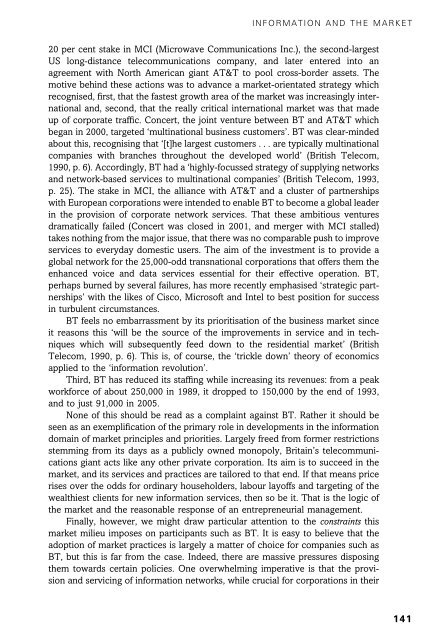Theories of the Information Society, Third Edition - Cryptome
Theories of the Information Society, Third Edition - Cryptome
Theories of the Information Society, Third Edition - Cryptome
You also want an ePaper? Increase the reach of your titles
YUMPU automatically turns print PDFs into web optimized ePapers that Google loves.
INFORMATION AND THE MARKET<br />
1<br />
1<br />
1<br />
2<br />
1<br />
1<br />
20 per cent stake in MCI (Microwave Communications Inc.), <strong>the</strong> second-largest<br />
US long-distance telecommunications company, and later entered into an<br />
agreement with North American giant AT&T to pool cross-border assets. The<br />
motive behind <strong>the</strong>se actions was to advance a market-orientated strategy which<br />
recognised, first, that <strong>the</strong> fastest growth area <strong>of</strong> <strong>the</strong> market was increasingly international<br />
and, second, that <strong>the</strong> really critical international market was that made<br />
up <strong>of</strong> corporate traffic. Concert, <strong>the</strong> joint venture between BT and AT&T which<br />
began in 2000, targeted ‘multinational business customers’. BT was clear-minded<br />
about this, recognising that ‘[t]he largest customers . . . are typically multinational<br />
companies with branches throughout <strong>the</strong> developed world’ (British Telecom,<br />
1990, p. 6). Accordingly, BT had a ‘highly-focussed strategy <strong>of</strong> supplying networks<br />
and network-based services to multinational companies’ (British Telecom, 1993,<br />
p. 25). The stake in MCI, <strong>the</strong> alliance with AT&T and a cluster <strong>of</strong> partnerships<br />
with European corporations were intended to enable BT to become a global leader<br />
in <strong>the</strong> provision <strong>of</strong> corporate network services. That <strong>the</strong>se ambitious ventures<br />
dramatically failed (Concert was closed in 2001, and merger with MCI stalled)<br />
takes nothing from <strong>the</strong> major issue, that <strong>the</strong>re was no comparable push to improve<br />
services to everyday domestic users. The aim <strong>of</strong> <strong>the</strong> investment is to provide a<br />
global network for <strong>the</strong> 25,000-odd transnational corporations that <strong>of</strong>fers <strong>the</strong>m <strong>the</strong><br />
enhanced voice and data services essential for <strong>the</strong>ir effective operation. BT,<br />
perhaps burned by several failures, has more recently emphasised ‘strategic partnerships’<br />
with <strong>the</strong> likes <strong>of</strong> Cisco, Micros<strong>of</strong>t and Intel to best position for success<br />
in turbulent circumstances.<br />
BT feels no embarrassment by its prioritisation <strong>of</strong> <strong>the</strong> business market since<br />
it reasons this ‘will be <strong>the</strong> source <strong>of</strong> <strong>the</strong> improvements in service and in techniques<br />
which will subsequently feed down to <strong>the</strong> residential market’ (British<br />
Telecom, 1990, p. 6). This is, <strong>of</strong> course, <strong>the</strong> ‘trickle down’ <strong>the</strong>ory <strong>of</strong> economics<br />
applied to <strong>the</strong> ‘information revolution’.<br />
<strong>Third</strong>, BT has reduced its staffing while increasing its revenues: from a peak<br />
workforce <strong>of</strong> about 250,000 in 1989, it dropped to 150,000 by <strong>the</strong> end <strong>of</strong> 1993,<br />
and to just 91,000 in 2005.<br />
None <strong>of</strong> this should be read as a complaint against BT. Ra<strong>the</strong>r it should be<br />
seen as an exemplification <strong>of</strong> <strong>the</strong> primary role in developments in <strong>the</strong> information<br />
domain <strong>of</strong> market principles and priorities. Largely freed from former restrictions<br />
stemming from its days as a publicly owned monopoly, Britain’s telecommunications<br />
giant acts like any o<strong>the</strong>r private corporation. Its aim is to succeed in <strong>the</strong><br />
market, and its services and practices are tailored to that end. If that means price<br />
rises over <strong>the</strong> odds for ordinary householders, labour lay<strong>of</strong>fs and targeting <strong>of</strong> <strong>the</strong><br />
wealthiest clients for new information services, <strong>the</strong>n so be it. That is <strong>the</strong> logic <strong>of</strong><br />
<strong>the</strong> market and <strong>the</strong> reasonable response <strong>of</strong> an entrepreneurial management.<br />
Finally, however, we might draw particular attention to <strong>the</strong> constraints this<br />
market milieu imposes on participants such as BT. It is easy to believe that <strong>the</strong><br />
adoption <strong>of</strong> market practices is largely a matter <strong>of</strong> choice for companies such as<br />
BT, but this is far from <strong>the</strong> case. Indeed, <strong>the</strong>re are massive pressures disposing<br />
<strong>the</strong>m towards certain policies. One overwhelming imperative is that <strong>the</strong> provision<br />
and servicing <strong>of</strong> information networks, while crucial for corporations in <strong>the</strong>ir<br />
141
















